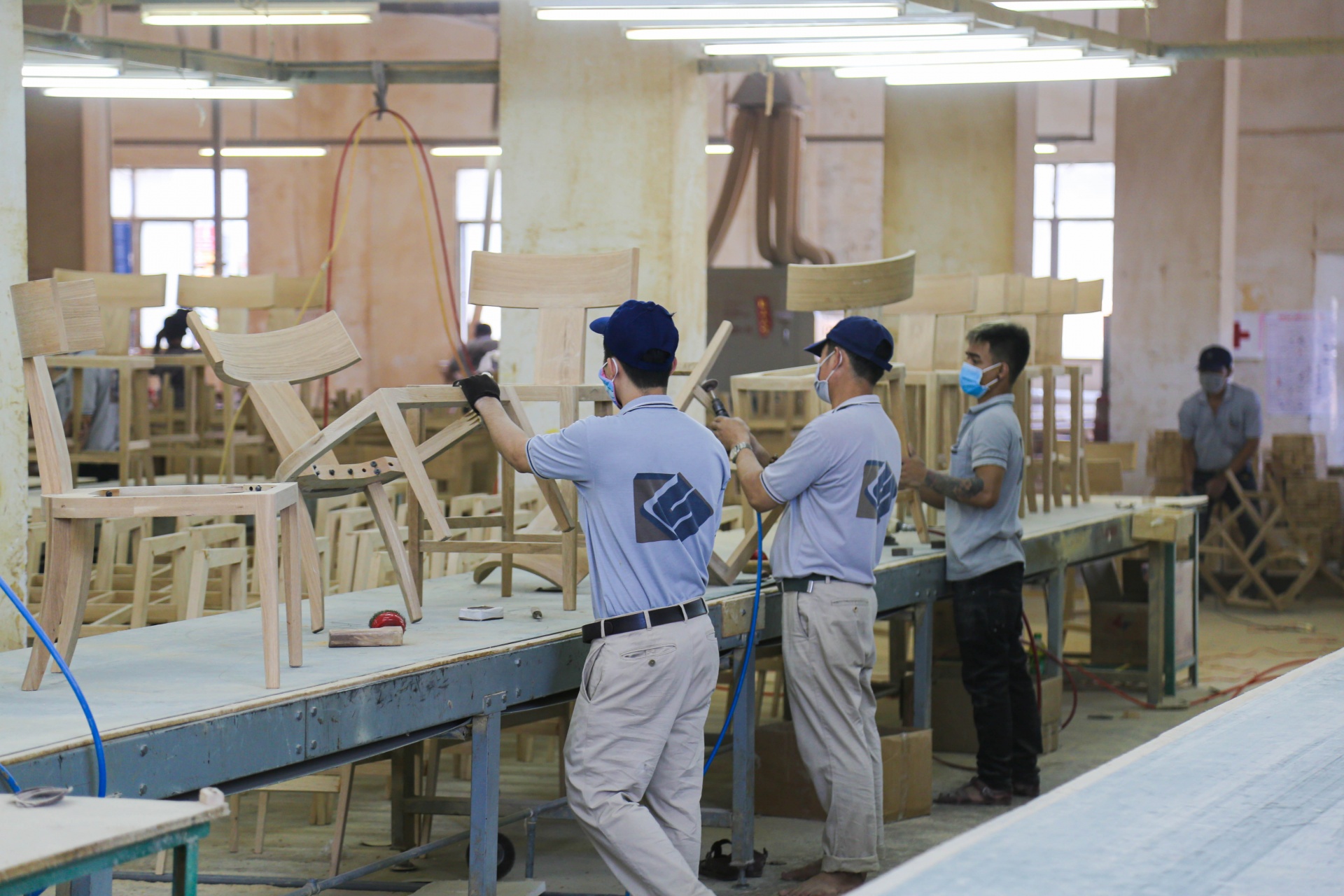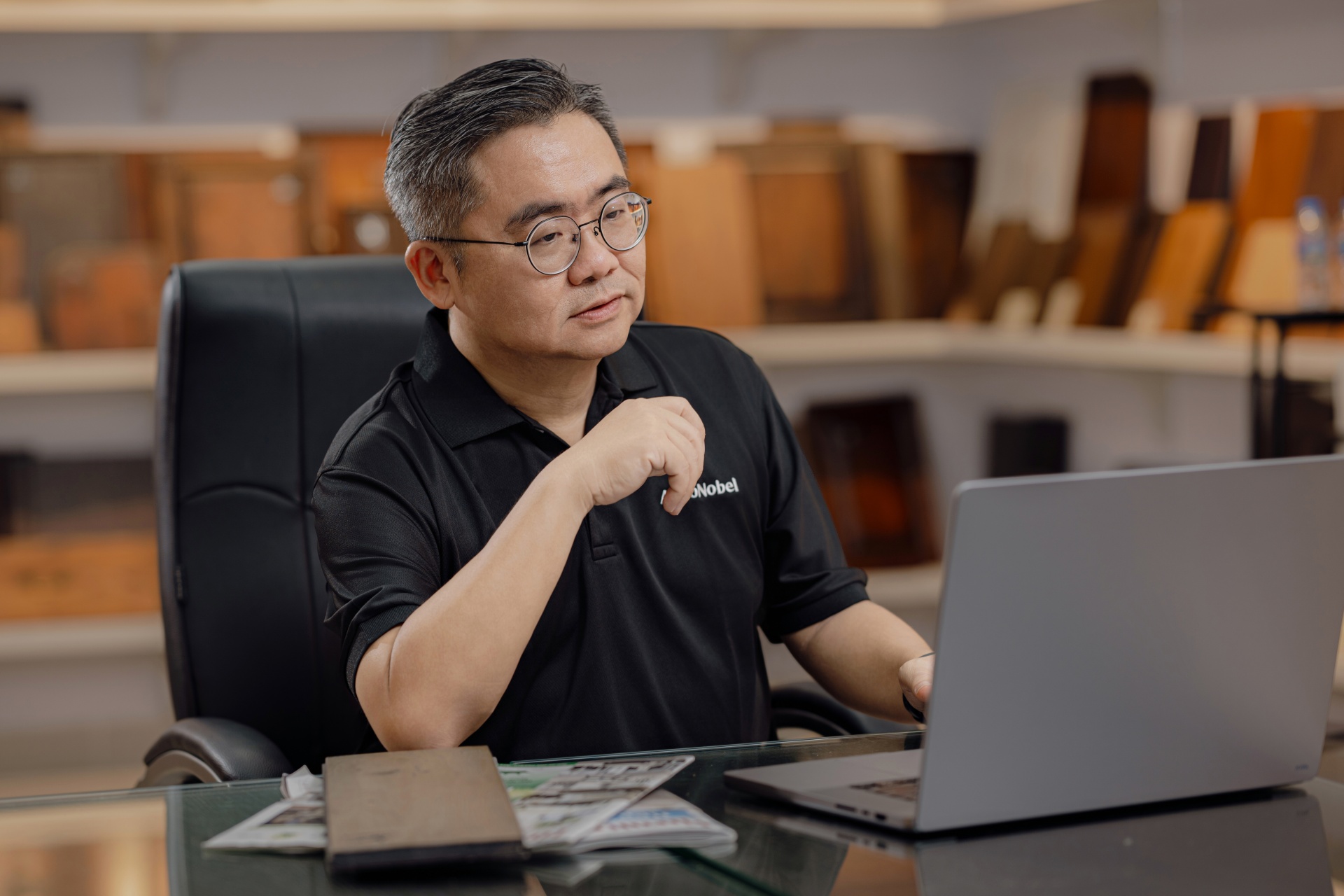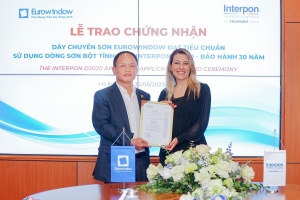Greening the furniture industry: What needs to be done?
 |
Not moving too fast
In August 2023, AkzoNobel, a supplier of paints and surface solutions, received an order from a large wood processing business. The factory needed a solution for surfaces with a metallic effect, water resistance, high durability, water-based raw materials, environmental friendliness, and, most importantly, minimal emissions for a high-end customer in the US.
Tee Loi Gan, South Asia technical service manager for Wood Finishes at AkzoNobel noted, “This is a challenging requirement, and to meet it, AkzoNobel’s technical team had to research for months to find a solution for the customer.”
According to Gan, apart from the high technical requirements, this order reflects the transformation of furniture companies in response to the green production trend. Furniture exports have long been associated with sustainability goals, specifically using legally sourced wood and avoiding harmful substances. However, the demand for sustainable consumption and increasingly strict controls from regulatory agencies are introducing new challenges to the industry.
 |
| Tee Loi Gan, South Asia technical service manager for Wood Finishes at AkzoNobel |
The EU’s overall climate ambition is to achieve neutrality by 2050. Therefore, products imported into the EU, including furniture, not only have to be produced from legally grown wood but also state the carbon footprint of their production process.
To Xuan Phuc, from the organisation Forest Trends commented, “In addition to rising consumer demands for sustainability, these new standards pose many challenges for Vietnamese companies. There is still time, but without early preparation, the risk of losing a competitive advantage is very real.”
A prominent example of losing a competitive edge is the sudden drop in orders for the garment and textile industry in favour of Bangladesh, a competitive rival. Some Vietnamese furniture manufacturers are taking this as a cautionary sign. However, their investment strategies and transformation approaches are cautious.
Dwayne Wood, CEO of Kaiser Vietnam, mentioned that since the beginning of their operations in Vietnam, Kaiser has strictly adhered to the country’s environmental regulations and import market requirements.
“We pursue sustainable development targets, but we don’t rush to be pioneers. We seek solutions to meet the market’s current requirements without going too far to ensure our investments are optimised,” he shared.
Green Partners, Green Processes
Wood stated that their factory has a suitable strategy to deal with the European Green Deal.
"Choosing like-minded partners is crucial, since furniture production requires companies to assemble an ecosystem of various suppliers. For paint, we chose AkzoNobel, a brand that guarantees the strictest green standards in the world," noted Wood.
According to the Kaiser executive, green suppliers will help companies ensure the greening of their entire furniture production process. Gan echoed this sentiment, stating that with a globally recognised brand like AkzoNobel, many furniture manufacturers automatically highlight its involvement to their customers as a guarantee of safety, environmental friendliness, and quality.
 |
AkzoNobel currently has 4,000 scientists working to adapt to the global climate change challenges. They focus on testing and improving processes to minimise waste and conserve energy and other resources. As a result, the brand has set high green standards for its paint, providing premium, eco-friendly finishes and high-quality products. Its interior surface coatings are no exception to these standards.
“The key is that we work closely with furniture manufacturers, provide training and guidance on usage, and improve performance to give them a competitive edge. Therefore, choosing a partner like AkzoNobel is an effective solution because it meets international certification requirements and provides technical support to achieve green production solutions,” emphasised Gan.
The head of AkzoNobel’s interior paint division stated that compared to other countries like Singapore or Indonesia, the Vietnamese market has its unique dynamics. Furniture companies frequently require sample supplies quickly. Therefore, AkzoNobel’s technical team always needs to strive to meet these demands.
Thanks to suitable human resource development policies, AkzoNobel has a highly skilled technical team, with many members having over 20 years of experience. This advantage helps the company meet the constantly rising requirements of furniture manufacturing companies.
Gan predicted, “In the future, with the specific commitments to sustainable development made at COP26, the Vietnamese government’s policies will gradually move towards higher safety and environmental product standards. Furniture companies will need to be green, both in their exports and in the domestic market. Therefore, the requirements from furniture manufacturing companies will continue to rise even further.”
 | AkzoNobel co-creates an exciting summer playground for children Dulux EasyClean from AkzoNobel held the Summer Playground - The Carefree Wall at AEON Mall Tan Phu Celadon in Ho Chi Minh City on June 24. This is the second such offering after the summer playground at AEON Mall Binh Duong, providing children with the opportunity to play and create a fun space for themselves. |
 | AkzoNobel awarded certificate for paint product AkzoNobel, a leading company in the paint and coatings industry, has been awarded a certification for one of its paint products. |
 | AkzoNobel advances eco-friendly coating solutions through innovative sustainability initiatives Amid the global push for eco-friendly practices in construction and manufacturing, AkzoNobel, a prominent figure in the coatings industry, is leading the way in pioneering sustainable solutions to reduce its environmental impacts. VIR’s Linh Le spoke to Şirvan Canıtez, AkzoNobel’s regional commercial director of Powder Coatings Business in South Asia-Pacific, to gain insights into its electrostatic powder coating products and its noteworthy contributions to the industry's sustainable future. |
What the stars mean:
★ Poor ★ ★ Promising ★★★ Good ★★★★ Very good ★★★★★ Exceptional
 Tag:
Tag:
Related Contents
Latest News
More News
- Masan Consumer names new deputy CEO to drive foods and beverages growth (February 23, 2026 | 20:52)
- Myriad risks ahead, but ones Vietnam can confront (February 20, 2026 | 15:02)
- Vietnam making the leap into AI and semiconductors (February 20, 2026 | 09:37)
- Funding must be activated for semiconductor success (February 20, 2026 | 09:20)
- Resilience as new benchmark for smarter infrastructure (February 19, 2026 | 20:35)
- A golden time to shine within ASEAN (February 19, 2026 | 20:22)
- Vietnam’s pivotal year for advancing sustainability (February 19, 2026 | 08:44)
- Strengthening the core role of industry and trade (February 19, 2026 | 08:35)
- Future orientations for healthcare improvements (February 19, 2026 | 08:29)
- Infrastructure orientations suitable for a new chapter (February 19, 2026 | 08:15)





















 Mobile Version
Mobile Version